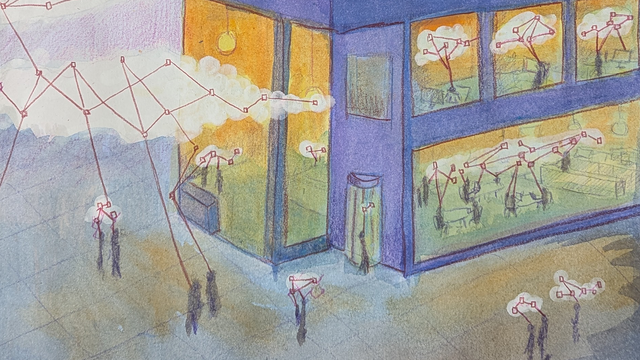Mapping Knowledge, Building Trust: A New Phase for the Knowledge Diplomacy Project

Dr Monja Stahlberger discusses the Knowledge Diplomacy Project’s new phase, launching an innovative mapping initiative in collaboration with the Mapping the Arts and Humanities Project to make cross-border academic collaborations visible. This tool aims to actively enable knowledge diplomacy, helping universities, researchers, practitioners, and policymakers build trust and strengthen international relations beyond traditional state-led channels.
Since its inception in 2019, the Knowledge Diplomacy Project has continuously investigated innovative approaches to international collaboration beyond the diplomatic sphere. Our activities have included major conferences in Paris (2023) and London (2024), academic-practitioner workshops attracting over 500 participants, and a targeted seminar series on cities and environmental issues. Notable outputs include the forthcoming Manchester University Press volume Knowledge Diplomacy: Developments and Future Trends (2026), workshop reports, and strategic partnerships with organisations such as the British Council and the Goethe-Institut.
Knowledge Diplomacy refers to, as defined by Janet Knight (2021), “the process of building and strengthening relations between and among countries through international higher education, research and innovation.”
For us, here at the Knowledge Diplomacy Project, the term emphasises that cross-border knowledge exchange (whether scientific, technical, or humanistic) is first and foremost a collaborative method that goes beyond embassies and consulates.
Unlike traditional diplomacy, which is largely conducted by states, Knowledge Diplomacy recognises that universities, research institutes, cultural organisations, and students themselves are central players in shaping global dialogue and international relations.
We are increasingly aware that researchers, policymakers, and practitioners across academia, industry, and society are already engaging in forms of Knowledge Diplomacy, even if not always under that label. Such work often appears under related terms like “public impact and engagement,” “international collaboration and partnerships,” or “knowledge exchange.”
The Knowledge Diplomacy Mapping Initiative builds on these practices by providing an innovative tool that promises to enhance how we visualise and navigate diplomatic networks. In addition to supporting existing efforts, it makes the practice of Knowledge Diplomacy more visible to new audiences. In doing so, it encourages a shared vocabulary and opens up opportunities for new collaborations across different fields.
Knowledge Diplomacy is for All
The Knowledge Diplomacy Project has established networks that connect a wide range of disciplines and sectors, including diplomats, libraries, universities, and policymakers across 75 organisations worldwide. Building on this solid foundation, the project is now expanding its strategic reach while deepening its practical applications.
This expansion comes at an opportune moment. As global challenges demand increasingly sophisticated responses, universities and independent research institutions are stepping forward as powerful diplomatic catalysts. Embodying this opportunity, the project’s central mission is to explore how universities can systematically leverage their transnational networks and knowledge capabilities to create resilient diplomatic pathways that complement and strengthen traditional channels.
The Power of Mapping Knowledge Networks
The mapping platform is designed to serve a wide range of stakeholders: researchers and scholars in international relations, political sciences, and diplomacy studies seeking to identify collaboration opportunities and understand knowledge diplomacy networks; higher education professionals building international partnerships; diplomacy practitioners operating beyond traditional chancelleries; policy makers and advocates identifying trends and opportunities; and NGOs engaged in cross-border knowledge sharing.
Through the Knowledge Mapping Initiative, we also aim to demonstrate the relevance of Knowledge Diplomacy to other disciplines by broadening our understanding of how knowledge moves across disciplines and borders.
Looking Ahead
The Knowledge Diplomacy Project’s future depends on whether it can help the people who need it most: the researchers and scholars trying to explain their international impact or find collaborators and funders across borders, the practitioners building networks, and the policymakers looking for new approaches to global challenges.
Many of us are doing this crucial informal work that might not be as easily represented on impact statements — convening cross-border conversations and building trust between communities, whether that is through seminars, conferences, research, or public outreach. The mapping initiative makes these connections and efforts, which already exist but are often hard to see, visible. It is a platform that shows diplomacy happens on so many different levels ranging from workshops and working papers, from knowledge exchange to official agreements.
The new phase of the project therefore marks a shift from documenting and analysing Knowledge Diplomacy towards actively enabling it through accessible tools and a shared vocabulary.
We warmly invite you to explore the mapping platform with us, contributing to the work, charting these previously unmapped connections.
Sign up for the focus group sessions for an exclusive peek at the Map here.
Are you on the map? See here.
Add yourself on the map here!
Monja Stahlberger is Project Coordinator for the Knowledge Diplomacy Project at the University of London Institute in Paris, where she coordinates project communications and co-organises conferences and roundtables. She is also a Postdoctoral Research Fellow at the Leo Baeck Institute London. Her research expertise in cultural exchange, transnationalism, and cross-border identity formation directly informs her work in knowledge diplomacy. She completed her PhD in Exile Studies at the University of London.

In Development: Mapping the Humanities and AI
Humanities scholars across the UK are shaping critical thinking and practical action around AI. But the work is scattered across institutions and websites, which is making connections harder to spot. Mapping the Humanities and AI is a map in development that will visualise this activity, highlight networks and gaps, and support collaboration across research, policy, and practice.

Knowledge Diplomacy in Context: British Council, A Legacy of Building Connections
Michael Peak joins us for the "Knowledge Diplomacy in Context" series, which spotlights real-world...
Mapping Openness and AI: Insights from the AI and Openness Workshop for the Arts and Humanities (Part 1)
Sinem Görücü / Silicon Landscapes / Licenced by CC-BY 4.0Following the “AI and Openness” workshop,...

Knowledge Diplomacy in Context
International collaboration strengthens global ties, but the vital infrastructure behind it often...

UK DARIAH Day 2025: Imagining Future Digital Research Infrastructures
As the landscape of arts and humanities research becomes increasingly digitised, the necessity for...
Join our mailing list
Receive blogs as soon as they’re published, along with project updates and event information, plus special access to digital tools to help you make the most of the dataset.
